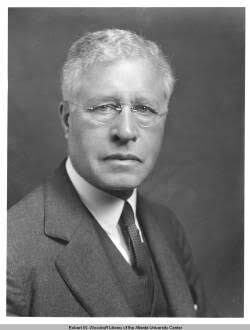John Hope
John Hope (1868—1936) born poor in Augusta, Georgia, became the first self-identified African-American president of Morehouse College in Atlanta in 1906 after joining the faculty in 1898. Hope graduated from Brown University, with a B.A. in philosophy in 1894 (Davis, L. 1998). Hope did graduate work for a PhD. in classics from the University of Chicago but never finished due to his responsibilities as a professor at Morehouse College. John Hope received an honorary master's degree from Brown University and an honorary PhD. from Howard University in 1920 (Davis, L. 1998). Publicly, John Hope was uncomfortable with his title of “Doctor” and preferred to be called simply “John Hope” (Davis, L. 1998). Privately, he was happy to receive the degree and told his friend Jesse Moorland that “it came at the right time” (Davis, L. 1998). Mr. Hope held many memberships in different organizations. He was a charter member of the Atlanta chapter of Sigma Pi Phi Fraternity, Inc (Kappa Boulé, 1920), and a member of Alpha Phi Alpha Fraternity, Inc. (Eta Lambda, 1923) (Davis, L. 1998).
John Hope had “A clashing of the soul” when it came to his racial identity. Hope was born in a racial union between James Hope (White Father) and Marry Francis Butts (Black Mother). Hope was given multiple chances to “pass” but he refused because he had pride in his race (Davis, L. 1998). For example, Hope wanted to join a white fraternity at Brown University but was told that they would only initiate him if he chose to pass and he declined. When James Hope died, the New York Hope family (White) chose to cut all funds and ties with the Georgia Hope family (Black), which lead John Hope and his siblings to grow up poor (Davis, L. 1998).
At Morehouse College, John Hope was a tough president and had very strict rules. These strict rules were adopted from his experiences at Worcester Academy and Brown University. Hope’s best friend W.E.B Du Bois was the one who convinced him to ease up on his strict rules because it restrained what was essential for college life (Jones, E. 1967). Additionally, Hope introduced a difficult liberal arts curriculum to Morehouse. Chapel (crown forum) was every day (Monday-Friday) from 9:30 am until 10:00 am (Jones, E. 1967). The most interesting thing was that “no man” could get a degree from the college until he had convinced and memorized an original oration (Jones, E. 1967). Students were required to write one each year for four years and were not permitted to graduate until they gave their oration in front of the student's body, faculty, and staff. Hope also introduced the sport of Football to Morehouse (Davis, L. 1998).
Hope was married to Lugenia Burns Hope, a social reformer who was a founder of the Neighborhood Union and played a crucial part in the founding of Booker T. Washington High School (1924) (Davis, L. 1998). Lastly, John Hope died from pneumonia on the campus of Spelman College in 1936. John Hope died the day after his wife’s birthday. One of his last words was “If only I could tell my successor what I Was trying to do ….. there is much work left to be done” (Davis, L. 1998). Hope served three decades as president of Morehouse College.
